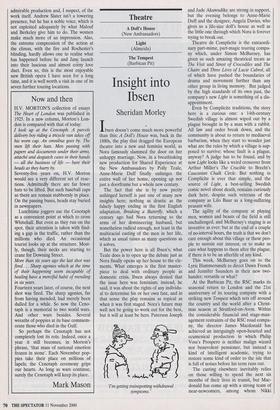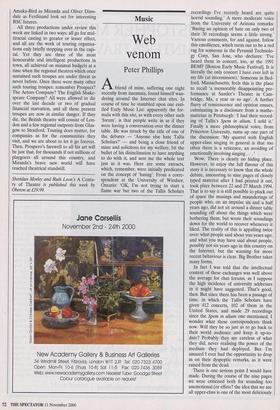Theatre
A Doll's House (New Ambassadors)
Light (Almeida) The Tempest (Barbican Pit)
Insight into Ibsen
Sheridan Morley
Ibsen doesn't come much more powerful than this: A Doll's House was, back in the 1880s, the play that dragged the European theatre into a new and feminist world, as Nora famously slammed the door on her unhappy marriage. Now, in a breathtaking new production for Shared Experience at the New Ambassadors by Polly Teale, Anne-Marie Duff finally unhinges the entire wall of her home, opening up not just a doorframe but a whole new century.
The fact that she is by now pretty unhinged herself is just one of many new insights here; nothing as drastic as the falsely happy ending in the first English adaptation, Breaking a Butterfly, which a century ago had Nora returning to the arms of her domineering husband, but nonetheless radical enough, not least in the multiracial casting of the men in her life, which as usual raises as many questions as it solves.
But the power here is all Ibsen's; what Teale does is to open up the debate just as Nora finally opens up her house to the ele- ments. What emerges is the first master- piece to deal with ordinary people in domestic crisis. Ibsen always denied that the issue here was feminism; instead, he said, it was about the rights of any individu- al to determine his or her own fate, and in that sense the play remains as topical as when it was first staged. Nora's future may well not be going to work out for the best, but it will at least be hers. Paterson Joseph 'I'm getting trainspotting withdrawal symptoms.' and Jude Akuwudike are strong in support, but the evening belongs to Anne-Marie Duff and the designer, Angela Davies, who gives us a life-size doll's house as well as the little one through which Nora is forever trying to break out.
Theatre de Complicite is the extraordi- nary part-mime, part-magic touring compa- ny which, under Simon McBurney, has given us such amazing theatrical treats as The Visit and Street of Crocodiles and The Chairs and Three Lives of Lucie Cabral, all of which have pushed the boundaries of drama and movement further than any other group in living memory. But judged by the high standards of its own past, the company's new Light is something of a dis- appointment.
Even by Complicite traditions, the story here is a curious one: a 14th-century Swedish village is almost wiped out by a plague brought in by a man with a rabbit. All law and order break down, and the community is about to return to mediaeval barbarism, when they start to wonder just what are the rules by which a village is sup- posed to survive; whose fault is a plague, anyway? A judge has to be found, and by now Light looks like a weird crossover from Arthur Miller's The Crucible to Brecht's Caucasian Chalk Circle. But nothing in Complicite is ever that simple, and the source of Light, a best-selling Swedish comic novel about death, remains curiously dark here, despite such veterans of the company as Lilo Baur as a long-suffering peasant wife.
The agility of the company at playing men, women and beasts of the field is still unchallenged, and McBurney's staging is as inventive as ever: but at the end of a couple of no-interval hours, the truth is that we don't care enough about this village or these peo- ple to sustain our interest, or to make us care what happens to them after the plague, if there is to be an afterlife of any kind.
This week, McBurney goes on to the Lyric Hammersmith to direct Dawn French and Jennifer Saunders in their new two- hander; versatile or what?
At the Barbican Pit, the RSC marks its seasonal return to London and the 21st anniversary of its touring company with a striking new Tempest which sets off around the country and the world after a Christ- mas season at Stratford-on-Avon. Within the considerable financial and stage-man- agement restraints of the RSC road compa- ny, the director James Macdonald has achieved an intriguingly open-hearted and ecumenical production in which Philip Voss's Prospero is neither malign wizard nor benevolent pensioner, but instead a kind of intelligent academic, trying to restore some kind of order to the isle that is full of noises before his term runs out.
The casting elsewhere inevitably relies on those willing to spend the next six months of their lives in transit, but Mac- donald has come up with a strong team of near-newcomers, among whom Nikki Amuka-Bird as Miranda and Oliver Dims- dale as Ferdinand look set for interesting RSC futures.
All three productions under review this week are linked in two ways: all go for mul- tiracial casting to greater or lesser effect, and all are the work of touring organisa- tions only briefly stopping over in the capi- tal. Yet they are three of the most honourable and intelligent productions in town, all achieved on minimal budgets at a time when the regional theatres which once sustained such troupes are under threat as never before. Once there were many other such touring troupes: remember Prospect? The Actors Company? The English Shake- speare Company? All were allowed to die over the last decade or two of gradual financial starvation, and all these present troupes are now in similar danger. If they die, the British theatre will consist of Lon- don and a few regional outposts from Glas- gow to Stratford. Touring does matter, for companies as for the communities they visit, and we are about to let it go forever. Then, Prospero's farewell to all his art will be just that, for thousands if not millions of playgoers all around this country, and Miranda's brave new world will have reached theatrical standstill.
Sheridan Morley and Ruth Leon's A Centu- ry of Theatre is published this week by Oberon at £19.99.



























































































 Previous page
Previous page